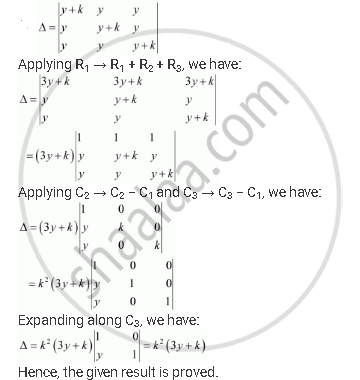Advertisements
Advertisements
प्रश्न
By using properties of determinants, show that:
`|(y+k,y, y),(y, y+k, y),(y, y, y+k)| = k^2(3y + k)`
उत्तर

APPEARS IN
संबंधित प्रश्न
Using properties of determinants, prove that
`|[b+c,c+a,a+b],[q+r,r+p,p+q],[y+z,z+x,x+y]|=2|[a,b,c],[p,q,r],[x,y,z]|`
Using the property of determinants and without expanding, prove that:
`|(2,7,65),(3,8,75),(5,9,86)| = 0`
By using properties of determinants, show that:
`|(0,a, -b),(-a,0, -c),(b, c,0)| = 0`
By using properties of determinants, show that:
`|(a-b-c, 2a,2a),(2b, b-c-a,2b),(2c,2c, c-a-b)| = (a + b + c)^2`
Using properties of determinants, prove that:
`|(1, 1+p, 1+p+q),(2, 3+2p, 4+3p+2q),(3,6+3p,10+6p+3q)| = 1`
Using properties of determinants, prove that `|(x,x+y,x+2y),(x+2y, x,x+y),(x+y, x+2y, x)| = 9y^2(x + y)`
Using properties of determinants, prove that `|(1,1,1+3x),(1+3y, 1,1),(1,1+3z,1)| = 9(3xyz + xy + yz+ zx)`
Using properties of determinants, prove the following :
Using properties of determinants, show that `|("a" + "b", "a", "b"),("a", "a" + "c", "c"),("b", "c", "b" + "c")|` = 4abc.
Without expanding determinants, prove that `|(1, yz, y + z),(1, zx, z + x),(1, xy, x + y)| = |(1, x, x^2),(1, y, y^2),(1, z, z^2)|`.
By using properties of determinants, prove that `|(x + y, y + z, z + x),(z, x, y),(1, 1, 1)|` = 0.
Without expanding determinants show that
`|(1, 3, 6),(6, 1, 4),(3, 7, 12)| + 4|(2, 3, 3),(2, 1, 2),(1, 7, 6)| = 10|(1, 2, 1),(3, 1, 7),(3, 2, 6)|`
Select the correct option from the given alternatives:
The determinant D = `|("a", "b", "a" + "b"),("b", "c", "b" + "c"),("a" + "b", "b" + "c", 0)|` = 0 if
If `|("x"^"k", "x"^("k" + 2), "x"^("k" + 3)),("y"^"k", "y"^("k" + 2), "y"^("k" + 3)),("z"^"k", "z"^("k" + 2), "z"^("k" + 3))|` = (x - y) (y - z) (z - x)`(1/"x"+ 1/"y" + 1/"z") ` then
Select the correct option from the given alternatives:
Which of the following is correct
Answer the following question:
Without expanding determinant show that
`|(l, "m", "n"),("e", "d", "f"),("u", "v", "w")| = |("n", "f", "w"),(l, "e", "u"),("m", "d", "v")|`
Evaluate: `|(0, xy^2, xz^2),(x^2y, 0, yz^2),(x^2z, zy^2, 0)|`
Prove that: `|(y + z, z, y),(z, z + x, x),(y, x, x + y)|` = 4xyz
Prove that: `|("a"^2 + 2"a", 2"a" + 1, 1),(2"a" + 1, "a" + 2, 1),(3, 3, 1)| = ("a" - 1)^3`
Find the value of θ satisfying `[(1, 1, sin3theta),(-4, 3, cos2theta),(7, -7, -2)]` = 0
The value of determinant `|("a" - "b", "b" + "c", "a"),("b" - "a", "c" + "a", "b"),("c" - "a", "a" + "b", "c")|` is ______.
If A, B and C are angles of a triangle, then the determinant `|(-1, cos"C", cos"B"),(cos"C", -1, cos"A"),(cos"B", cos"A", -1)|` is equal to ______.
The value of the determinant `|(x , x + y, x + 2y),(x + 2y, x, x + y),(x + y, x + 2y, x)|` is ______.
If cos2θ = 0, then `|(0, costheta, sin theta),(cos theta, sin theta,0),(sin theta, 0, cos theta)|^2` = ______.
If x = – 9 is a root of `|(x, 3, 7),(2, x, 2),(7, 6, x)|` = 0, then other two roots are ______.
`|(x + 1, x + 2, x + "a"),(x + 2, x + 3, x + "b"),(x + 3, x + 4, x + "c")|` = 0, where a, b, c are in A.P.
The determinant `|(sin"A", cos"A", sin"A" + cos"B"),(sin"B", cos"A", sin"B" + cos"B"),(sin"C", cos"A", sin"C" + cos"B")|` is equal to zero.
The value of the determinant `abs ((alpha, beta, gamma),(alpha^2, beta^2, gamma^2),(beta + gamma, gamma + alpha, alpha + beta)) =` ____________.
The A.M., H.M. and G.M. between two numbers are `144/15`, 15 and 12, but not necessarily in this order then, H.M., G.M. and A.M. respectively are
Let 'A' be a square matrix of order 3 × 3, then |KA| is equal to:
The value of the determinant `|(6, 0, -1),(2, 1, 4),(1, 1, 3)|` is ______.
By using properties of determinant prove that `|(x+y,y+z,z+x),(z,x,y),(1,1,1)|` = 0.
Without expanding evaluate the following determinant.
`|(1,"a","b+c"),(1,"b","c+a"),(1,"c","a+b")|`
if `|(a, b, c),(m, n, p),(x, y, z)| = k`, then what is the value of `|(6a, 2b, 2c),(3m, n, p),(3x, y, z)|`?
The value of the determinant of a matrix A of order 3 is 3. If C is the matrix of cofactors of the matrix A, then what is the value of determinant of C2?
Without expanding determinant find the value of `|(10, 57, 107),(12, 64, 124),(15, 78, 153)|`
By using properties of determinant prove that `|(x+y,y+z,z+x),(z,x,y),(1,1,1)|` = 0.
